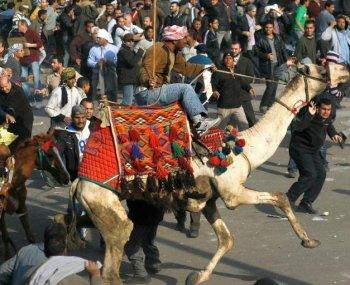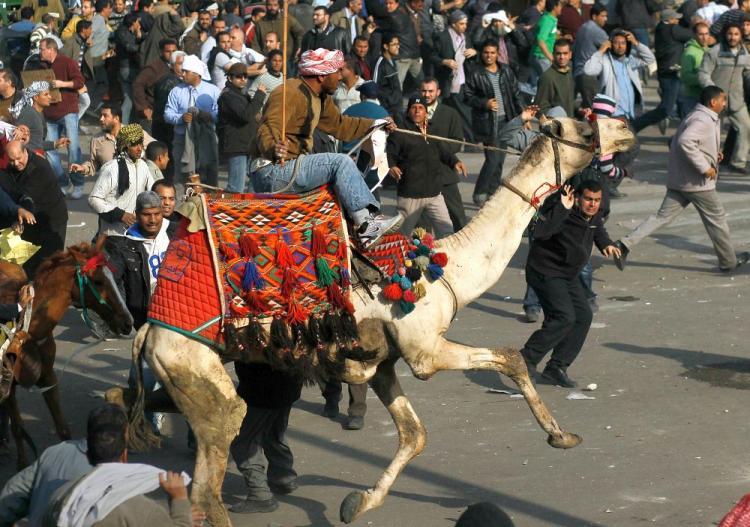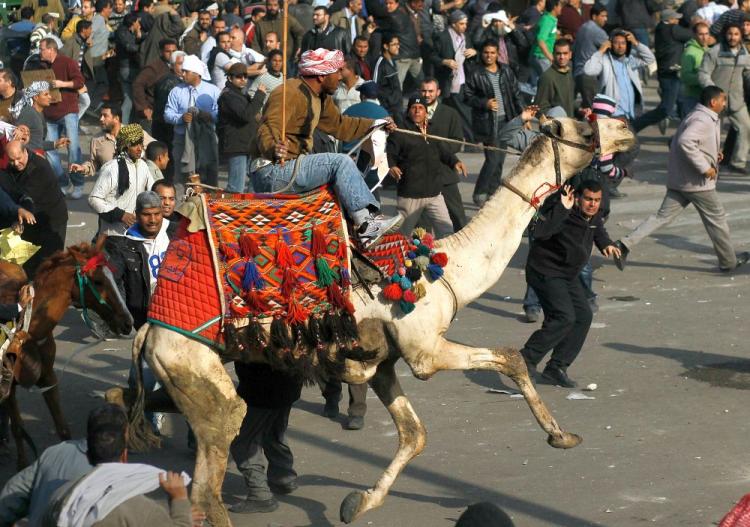For the first time since the protests calling for Mubarak to resign erupted Jan. 25, protesters in favor of the president showed up in the thousands on Cairo’s main square and in other cities.
On Tuesday, after seven days of mass protests, Mubarak announced he would not run for president in next September’s elections, after 30 years in power.
Protesters who support Mubarak are calling on anti-government protesters to go back home in view of the concessions Mubarak has already made.
The anti-government camp is now divided over whether or not they have achieved their aim. Some returned home after Tuesday’s announcement, while others are determined to stay in the streets until Mubarak is out of power.
“We have reached our maximum patience and we can’t be patient [any] more,” said Sally, a 24-year-old recently graduated dentist in Alexandria. She said that she and other protesters have lost faith in the regime and do not believe Mubarak will actually relinquish power.
Sally referred to a Facebook page that went up shortly after Mubarak’s announcement detailing why the author felt the president could not be trusted to keep his word.
“Mubarak in 1981 said he will only stay in power for 2 terms, and we all saw how this turned out to be,” wrote the author. “Giving the regime 7 months to regroup and plan, don’t you think for example they can’t manage to create a massive large scale pro Mubarak campaign asking him to re-run leaving him ‘with no choice’ but to re-run for another term?”
“If protesting stops now, it will never start again. At least not in those numbers, and thus creating no real pressure,” the author wrote, urging protesters not to let up.
However, others who support the goal of ousting Mubarak are satisfied that their main objectives have been met.
“I think that we have achieved a lot in those past eight days. We changed the constitution. We have a new government. We are sending the old government to trial and I would like to call for fair elections,” said Laila, a recently graduated pharmacist in Cairo.
“Now all the opposition is trying to make use of this situation. Now they seem as a united front, but after a while it will be a fight between them for power. So I need to see candidates, agendas, and fair elections to make sure we don’t have another Mubarak,” said Laila.
“I am not pro-Mubarak at all, but I am pro-Mubarak till September. You can’t leave a country as big as Egypt just like that. I would demonstrate to have the constitutional amendment active immediately and the old government and parliament going on trial now, but not for Mubarak to go now,” she said.
Both Sally and Laila are looking at who can lead the country. Both consider Amr Moussa as a possible next leader. Laila said Moussa was her number one choice because he is charismatic, diplomatic, close to the people, and that people “loved” him as Foreign Affairs minister.
Sally says she isn’t sure if she will return to the streets on Thursday, and that she’s confused about what to do.
“But if the news about the Egyptian Museum is true, I will,” she said.
Some of the worst fighting in Cairo’s Tahrir Square on Wednesday occurred just outside of the famed Egyptian Museum, reported Al Jazeera. Some Molotov cocktails reportedly landed in the museum garden, but the building itself, which contains artifacts from ancient Egypt, including items that belonged to King Tutankhamun, was unscathed.
Open Violence
At first the confrontations in Cairo were limited to heated discussions, but they soon turned violent with stones and other objects thrown between opposing sides. While some anti-government protesters chanted “We are one,” violent outbreaks began to erupt, leaving many protesters injured, reported CNN.
Live video aired by CNN showed about 50 people on horseback and on camels plowing into a crowd on Tahrir Square at 3 p.m. local time. Some riders were pulled down from the animals, apparently by anti-government protesters.
Officials reported Wednesday night that three people had been killed and another 1,500 injured, according to Reuters.
In the city of Alexandria, located 126 miles north of Cairo, there were also clashes between the groups of protesters on Wednesday.
Sally said she believes that at least some of the pro-Mubarak protesters were paid instigators because while she was standing at an army checkpoint, she saw soldiers find currency with sequential serial numbers on some Mubarak supporters.
“That means they are paid by the same person,” she surmised.
In the first days of the protest, police used tear gas against the mostly young protesters. However, by last Saturday, Jan. 29, police and other security forces were pulled off the streets leaving only army troops to deal with the conflict. The army has not exercised any force throughout the demonstrations.
“The army showed always that it is an honest supporting unit that defends Egypt, not the system,” said Sally.
Five days after the Internet connection was cut, Internet access was restored Wednesday.







